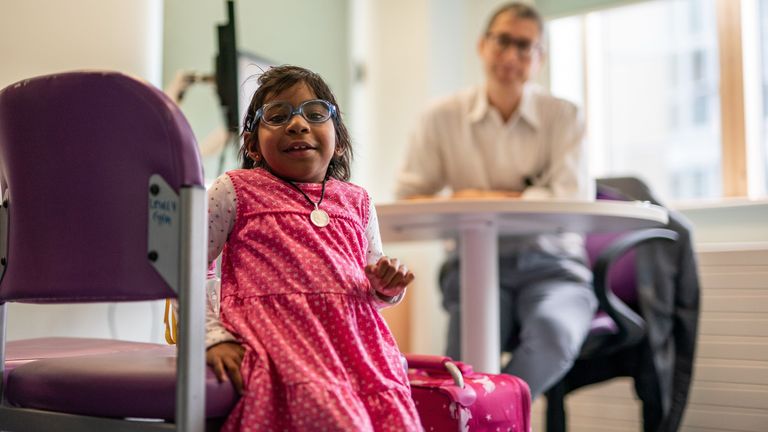In a historic medical achievement, an eight-year-old Indian-origin girl named Aditi Shankar has made history in the UK's National Health Service (NHS). Aditi has become the first person to undergo a transplant without the need for lifelong immunosuppressant drugs. This remarkable milestone comes after her immune system was reprogrammed by doctors, following her kidney transplant. Aditi's story is not only a testament to medical innovation but also a ray of hope for those facing similar challenges.
The Breakthrough Procedure: Aditi was diagnosed with a rare genetic condition that needed a kidney transplant. However, her case took a unique turn. Instead of a conventional transplant, Aditi received a stem cell transplant using bone marrow from her mother, Divya. Remarkably, her mother had also donated her kidney for the transplant. This innovative approach allowed Aditi's immune system to be reprogrammed, ultimately leading to a life-changing medical outcome.
Professor Stephen Marks, the Clinical Lead for Renal Transplantation at Great Ormond Street Hospital (GOSH) and a Professor of Paediatric Nephrology and Transplantation at University College London Great Ormond Street Institute of Child Health, expressed his awe at this groundbreaking achievement. He expressed, "This is the first time I have cared for someone in 25 years who has not required immunosuppression after kidney transplantation." This medical milestone opens doors to new possibilities in the realm of transplantation.
Aditi's case offers not only hope but also the potential for groundbreaking research in the field of organ transplantation. Professor Marks explained that they aspire to provide more children, like Aditi, who were previously deemed ineligible for kidney transplants, with the opportunity to undergo this life-changing procedure. The success of Aditi's treatment sets a precedent for further exploration into using bone marrow transplants followed by kidney transplants from the same living donor. This approach could revolutionize how seriously ill children and adults with kidney failure and other conditions are treated.
Aditi's transformation is nothing short of miraculous. Before her transplant, she had spent three years on dialysis, with her energy levels severely compromised. However, immediately after her kidney transplant, her vitality began to return. Aditi's father, Uday Shankar, shared their family's profound gratitude, stating, "The past three years Aditi's energy had been lost to dialysis. After her kidney transplant, almost instantly, we saw a big change in her energy levels. We take our organs for granted, but we all have such a gift in us." Aditi's newfound energy has enabled her to pursue activities she previously could only dream of, including swimming lessons.
The Medical Marvel Behind the Treatment: The groundbreaking aspect of Aditi's treatment lies in the reprogramming of her immune system. Ordinarily, organ transplant recipients must take immunosuppressant medications for the rest of their lives to prevent organ rejection. However, in Aditi's case, the simultaneous use of the same donor for bone marrow and kidney transplants reprogrammed her immune system. As a result, her immune system now matches her new kidney, significantly reducing the risk of rejection.
Great Ormond Street Hospital, renowned for its expertise in paediatric kidney transplantation and stem cell transplantation, led the way in this remarkable medical achievement. The hospital has long been at the forefront of research projects in these fields. Aditi's case showcases the institution's commitment to pushing boundaries and seeking innovative solutions to improve patient’s lives.
While this groundbreaking procedure offers tremendous hope and potential, it is important to note that it will likely be reserved for seriously ill patients who have exhausted other options. The risks associated with a double transplant, involving both bone marrow and kidney, are greater than those of a standard kidney transplant. Nonetheless, Aditi's success story serves as a ray of hope for those facing complex medical challenges and highlights the incredible potential of medical innovation to transform lives.
Aditi Shankar's historic journey from dialysis to a drug-free transplant represents a remarkable triumph of medical science, innovation, and human resilience. Her story not only provides hope for individuals facing similar medical conditions but also paves the way for future research and breakthroughs in the field of transplantation. As we celebrate Aditi's newfound energy and vitality, we are reminded of the immense potential of medical advancements to change lives and offer renewed hope to patients and their families

 Aditi Shankar's historic journey from dialysis to a drug-free transplant represents a remarkable triumph of medical science, innovation, and human resilience. Her story not only provides hope for individuals facing similar medical conditions but also paves the way for future research and breakthroughs in the field of transplantation
Aditi Shankar's historic journey from dialysis to a drug-free transplant represents a remarkable triumph of medical science, innovation, and human resilience. Her story not only provides hope for individuals facing similar medical conditions but also paves the way for future research and breakthroughs in the field of transplantation










.jpeg)











.jpg)








